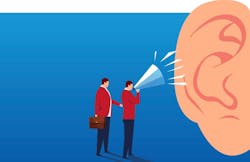Listen Up
I’ve written about communication before. It’s one of my favorite topics. It’s also a part of the daily grind that has given me the most ulcers. Communication is something I’ve seen immediate benefits from when I focus on it. It’s an investment that pays huge returns, yet costs nothing to invest in. I’m sure you’ve heard the saying we were born with two ears and only one mouth for a reason. I’m going to dive into what I believe is the most difficult, yet most rewarding, piece of communicating well, which is listening.
Whether you believe in the Bible or not, I’m willing to bet you’d agree we would all be better off if everyone followed the advice of one of my favorite verses, which states, “Let every person be quick to hear, slow to speak, and slow to anger.” I feel the second and third piece of that is relatively easy to understand. However, the first part—being quick to hear—is something a little more challenging. Take a few seconds and think about how you would describe what it means to be quick to hear.
So, how do we be “quick to hear?” The first step is to take the time to make sure we understand what the person means when they are talking. If they say they will be done later today, does that mean in one hour, before lunch, or by the end of day? There have been many instances when I felt as though I met the request by someone to get something done “later” only to find out I disappointed them because we had a different understanding of what “later” meant. A simple follow-up to that would be, “What do you mean by ‘later’?” It’s an easy question to ask and ensures both parties are on the same page.
When we focus on being quick to hear, we also need to seek to understand what the person is feeling through their words. If a tech asks me, “Do we really need to do that?” I could simply answer “yes” and it would likely get done. If I was listening to know what they were feeling at the moment, I would realize what they were likely communicating to me is, “I don’t think we need to do that.” If I just answered the question and moved on, I missed a golden opportunity to explain the “WHY” in why we do what we do. If someone understands why we do things, it will dramatically change how they do it.
We also need to pay attention to what someone is trying to accomplish with their words. The other day, I noticed a tech, Dave, was outside getting ready to pull a car in. Since it was about 20 degrees outside, I walked over to the garage door so I could close it once he pulled the car in. Another tech, Chris, wasn’t sure that I knew Dave was outside about to pull a car in, so he let me know to leave the door open for him. My immediate reaction was to get offended, as I surely knew Dave was outside pulling a vehicle in. After I took the time to think about what Chris was trying to accomplish with his words, I realized he wasn’t trying to tell me something I didn’t know, he just wanted to make sure Dave was able to pull the car in. It’s so easy to get offended if we think someone is telling us something because we don’t know, when most of the time that’s not what the other person is trying to accomplish.
A breakdown in communication can add an awful lot of cost to a repair. Just a few of the symptoms of not being quick to listen could be not billing for a labor operation that was done, not ordering a part that was needed, painting over damage that should have been fixed, etc. If we had the ability to hear our teammates, customers, and insurance partners well, I think we’d eliminate the lion’s share of our daily struggles. Eliminating most of those issues leads to higher CSI, ESI, and sales. It also reduces stress, cycle time, and redos.
Taking the time to review communication skills with our team is something we could do right now at this very moment. The best way to ensure that those communication skills permeate throughout our company is by practicing them ourselves daily. Leading, or should I say listening, by example is something that will benefit everyone of our stakeholders. The best part of becoming a better listener is that it’s a skill that can be used at home, with friends, and everyone else with whom we come in contact. When just one person makes the decision to be quick to hear, everyone wins.



